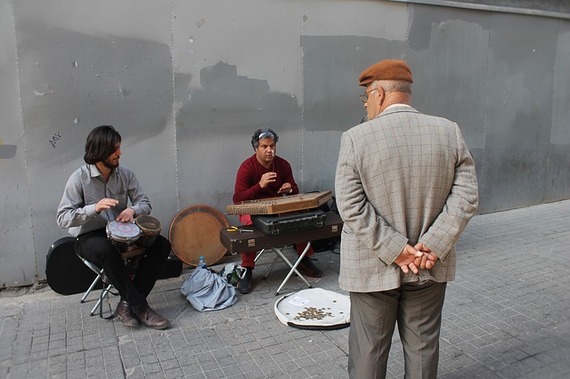I went to a street dance the other night looking forward to some vigorous exercise. When I got there, the band was playing away covering a lot of classic dance tunes. But everybody was sitting down. After a few attempts at dancing my wife and I left. Yet, just a few nights before I went to a concert where another group also played covers. Although it supposedly was playing a concert, the band had everybody up dancing and swaying to the music. Go figure. Nobody danced to the dance band but everyone got into it at a concert. As I reflect on this, I can't help but ponder the relationships between the act of playing music, the nature of productive economies, and the environment. It seems to me that the answer to my question must have something to do with confusing productivity and efficiency, music and notes.
I've been playing instruments and singing for most of my life, receiving the benefit of classical training as well as of sitting at the elbows of Appalachian fiddlers and ballad singers. They taught me that there's a big difference between notes and music. Some days when I play through a piece or tune, I reasonably enjoy myself. The fingers or voice work more or less, and the notes pretty much come out as planned. Other days the music sweeps me into a huge symphony of song far bigger than myself. After this kind of session I leave with a sense of awe and humility. What makes the difference?
As far as I can tell, of course, my mood and degree of distraction have a lot to with it. When I'm really playing music, I pay attention to each note -- its shape, strength, and sound quality -- caressing it and giving it my total attention. Each note gets its moment as part of a musical idea or phrase. These phrases take shape as I craft each note according to how it contributes to the idea the phrase expresses. All these phrases ultimately derive their meaning within the overall message of the tune, which sometimes has little to do with the lyrics (if there are any). Let's face it. Good music touches us deeply in places that words seldom reach. We hear echoes of the profound in the depths of our heart. True music making for me demands that I totally give myself to each sound and to each one relative to all the others, and to allow them to move me in unanticipated directions. Music demands love and selflessness so that when I really make music, I never know what will emerge. One never controls music.
I have noticed something else in all this. The spaces between the notes and between each phrase matter just as much as the sounds themselves. Music requires silence. Without the pregnant pauses between the phrases the latter don't speak. We require these silences, each with its own shape and length, for us to grasp the ideas the phrases want to communicate. These spaces to no small degree give the tune its life. Ironically, without quiet music falls flat.
The band at the street dance did a fine job playing the notes. The other band's music, however, dipped and soared, hung and danced. So did the people.
I think we as a people -- consumers, workers, and producers -- play a lot of street dances. We confuse making and consuming lots of things with productivity. After all, we can measure output per worker, gallons per minute, and bushels per acre. The higher the number, the more efficient or better the production or worker. Right? The more we consume per person, the better off we are.
I can't help but wonder whether in these cases we've truly produced anything or really are better off. I would hazard to say that all too often the answer is "no." That's because often we only excel at playing notes. We have great technique. Unfortunately we all too often seem to have lost track of making music and what it takes. For instance, when we ask people to work, do we encourage them to take time to reflect and recoup, or do we penalize them for not making quotas or taking too long? Do we focus on producing goods and services that enrich their users or those that distract them from the things that do? Which of these goods and services do we demand from the producers? At the end of the day do we go to bed, tired perhaps, but more whole and human than when we woke up? Or not? Do we craft lives or do machine-like replicate one day after another? Do we play music or notes?
Perhaps we would benefit as a society if we collectively and individually were to spend time focusing on the quality of our doing instead of the quantity of it, and to dote on the spaces between our actions. If we did, perhaps we would become crafts persons of whatever we do and connoisseurs of quiet. If this were to happen, I can't help but think that we would take the same loving care with the way we craft our environment. I can't help but think that the other animate and inanimate creatures with whom we share this planet would rejoice at the prospect, If all this were to happen, maybe, just maybe, our society would learn to Sing and Dance.

